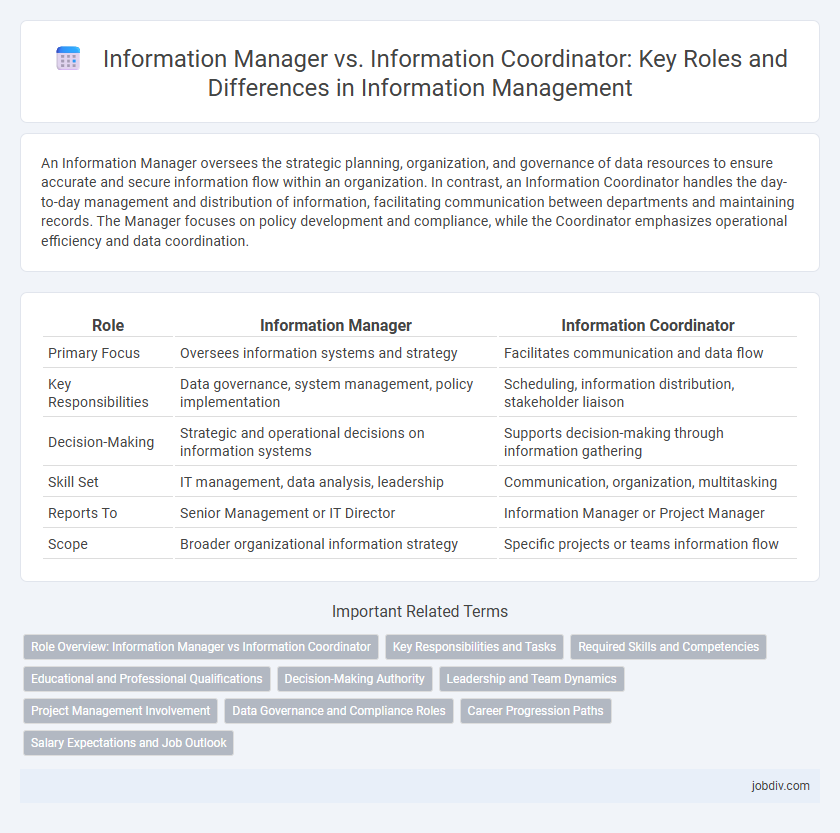An Information Manager oversees the strategic planning, organization, and governance of data resources to ensure accurate and secure information flow within an organization. In contrast, an Information Coordinator handles the day-to-day management and distribution of information, facilitating communication between departments and maintaining records. The Manager focuses on policy development and compliance, while the Coordinator emphasizes operational efficiency and data coordination.
Table of Comparison
| Role | Information Manager | Information Coordinator |
|---|---|---|
| Primary Focus | Oversees information systems and strategy | Facilitates communication and data flow |
| Key Responsibilities | Data governance, system management, policy implementation | Scheduling, information distribution, stakeholder liaison |
| Decision-Making | Strategic and operational decisions on information systems | Supports decision-making through information gathering |
| Skill Set | IT management, data analysis, leadership | Communication, organization, multitasking |
| Reports To | Senior Management or IT Director | Information Manager or Project Manager |
| Scope | Broader organizational information strategy | Specific projects or teams information flow |
Role Overview: Information Manager vs Information Coordinator
An Information Manager oversees the strategic planning, organization, and governance of data assets, ensuring data integrity and accessibility across the organization. An Information Coordinator focuses on the operational aspects, managing the flow, distribution, and accurate dissemination of information within teams or departments. Both roles facilitate effective information management but differ in scope, with the Manager handling policy and structure and the Coordinator executing daily information processes.
Key Responsibilities and Tasks
Information Managers oversee the strategic management and governance of data, ensuring accuracy, security, and compliance across organizational systems. Information Coordinators focus on the collection, organization, and dissemination of information to support daily operations and facilitate communication between departments. Both roles require strong data management skills, but Information Managers typically engage in higher-level planning and policy development, while Information Coordinators handle operational information flow and administrative tasks.
Required Skills and Competencies
Information Managers require advanced skills in data governance, strategic planning, and information system management, ensuring organizational data integrity and security. Information Coordinators need strong competencies in data organization, effective communication, and project coordination to facilitate efficient information flow across teams. Both roles demand proficiency in database management and analytical tools, but managers emphasize leadership and policy development while coordinators focus on operational support and detail-oriented execution.
Educational and Professional Qualifications
Information Managers typically require a bachelor's degree in information science, library science, or computer science, often complemented by a master's degree and professional certifications such as Certified Information Professional (CIP). Information Coordinators usually hold a bachelor's degree in fields like business administration, communication, or information technology, with experience in data management and project coordination considered essential. Both roles benefit from strong analytical skills and knowledge of database management systems, though Information Managers often require more advanced technical expertise and strategic planning capabilities.
Decision-Making Authority
Information Managers typically possess higher decision-making authority, overseeing strategic planning and data governance policies within an organization. Information Coordinators generally operate under the guidance of managers, focusing on implementing data collection protocols and ensuring accuracy in information dissemination. The distinction in authority directly impacts how each role contributes to organizational data management and operational efficiency.
Leadership and Team Dynamics
Information Managers lead cross-functional teams to develop strategic data initiatives, ensuring alignment with organizational goals and optimizing information workflows. They drive decision-making processes and foster collaboration by setting clear objectives and managing resource allocation. In contrast, Information Coordinators focus on supporting team dynamics through effective communication, task coordination, and maintaining accurate data records to enable seamless project execution.
Project Management Involvement
Information Managers lead strategic project management initiatives, ensuring alignment of information systems with organizational goals and overseeing resource allocation for optimal data flow. Information Coordinators focus on tactical project execution, managing communication between teams and organizing information to support project milestones. Both roles are essential in maintaining efficient information management through distinct levels of project involvement.
Data Governance and Compliance Roles
Information Managers oversee data governance frameworks, ensuring organizational compliance with regulatory standards such as GDPR and HIPAA through policy development and risk management. Information Coordinators support compliance efforts by managing data access, maintaining documentation, and facilitating communication between departments to uphold data integrity and security. Both roles collaborate to enforce data stewardship, but Information Managers drive strategic governance while Coordinators handle operational compliance tasks.
Career Progression Paths
Information Managers typically advance into senior roles such as Director of Information Systems or Chief Data Officer, leveraging expertise in strategic planning and data governance. Information Coordinators often progress to Information Analyst or Data Specialist positions, focusing on data quality and operational workflows. Career growth from Coordinator to Manager involves developing leadership skills and mastering advanced information management technologies.
Salary Expectations and Job Outlook
Information Managers typically command higher salaries than Information Coordinators due to their broader responsibilities in overseeing data systems and strategic planning. According to the Bureau of Labor Statistics, Information Managers earn median annual salaries ranging from $90,000 to $120,000, whereas Information Coordinators usually make between $45,000 and $65,000. Job outlook for Information Managers shows a growth rate of approximately 10% over the next decade, reflecting increased demand for advanced data management skills, while Information Coordinators have a steady but slower growth rate near 5%.
Information Manager vs Information Coordinator Infographic

 jobdiv.com
jobdiv.com